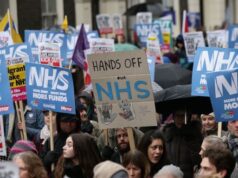Hospital Beds 2010 – 144,455: Hospital Beds 2018 – 127,225. Why? Why? Why?
The Labour Party’s analysis of NHS Digital data has revealed that over 17,000 hospital beds have been cut since 2010.
In 2018 the British Medical Association warned that 10,000 extra hospital beds were need.
In June 2019 NHS supremo Simon Stevens told NHS bosses that bed cuts should stop because they were leaving hospitals unable to cope with the number of people who needed to be admitted.
Well yes Mr Stevens, bears do indeed defecate in the woods….
Comparing Conservative and Labour Election Manifestos From the Care Perspective
NHS
Conservatives: Annual spend by 2024 – £149 billion. 50,000 extra nurses (this is widely disputed). 50 million extra GP appointments (this is not believable). 40 new hospitals (quite simply this is a lie)
Labour: Annual spend by 2024 – £155 billion
NHS Privatisation
Conservatives: Nothing
Labour: End and reverse privatisation of the NHS
Dementia
Conservatives: Double research funding and speed up trials for new treatments
Labour: Nothing
Mental Health
Conservatives: ‘Mental health will be treated with the same urgency as physical heath’
Labour: Implement all of the recommendations set out in the independent review of the Mental Health Act. Pledge to provide an extra £1.6 billion /year to ensure new standards for mental health are enshrined in the NHS Constitution. Invest £2 billion to modernise mental health hospitals and end the use of inappropriate out-of-area placements.
Social Care
Conservatives: Additional £1 billion annually from 2020
Labour: Additional £7 billion /year 2020/21 rising to £11 billion/year by 2023/24
Carers
Conservatives: Nothing
Labour: Increase Carers’ Allowance to the level of JobSeekers
Residential Care
Conservatives: Nothing
Labour: Reference to ‘…growing public sector provision’
Sheltered Housing
Conservatives: Nothing
Labour: Rent controls, ‘binding minimum standards (with inspections) may apply’
(Sources ONS, parliament.uk, Daily Telegraph)
Keep Our NHS Public (KONP) has put together an excellent list of care questions to ask prospective MPs at local hustings:
NHS Contracts Worth £14.7 Billion Awarded to Private Companies Since 2015
The GMB Union has announce the findings of research it commissioned with Tussell. Tussell provides data on Government contracts. £14.7 billion of the £24 billion outsourced NHS contracts awarded since 2015 went to private companies. That equates to 61% of all outsourced contracts. In 2018 it was 68% at £3.6 billion.
The largest recipients were Care UK (17%) and virgin care (13%). The highest value contract (£1 billion) went to a not-for-profit private enterprise called Sirona Care and Health in south west England for 10 years’ worth of adult community health services.
More at www.gmb.org.uk/news
94% of Directors of Adult Social Services Have Little Confidence They Can Meet their Statutory Responsibilities by the End of 2020/21
The Association of Directors of Adult Social Services (ADASS) has revealed some stark facts and views from its members in its Autumn 2019 survey.
Current Directors are planning to deliver £699 million savings in 2019/20.
They have identified unintended consequences arising from the strong focus on reducing rates of delayed transfers of care from hospitals in their areas. 85.5% of Directors say there have been moderate, significant or very significant increases in rapid discharges to short-term care home placements that become long-term (82.3% in 2018).
More at www.adass.org.uk
43% of NHS Junior Doctors in Obstetrics and Gynaecology are Suffering From Burnout
3,000 doctors working in Obstetrics and Gynaecology were interviewed in an Imperial College London (ICL) study. 43% said they had experienced symptoms of emotional exhaustion and lethargy.
When the ICL research was extended to all doctors, it was discovered that 36% were suffering from burnout.
More at: https://bmjopen.bmj.com
51,534 Adult (16+) Ealing Residents With a Common Mental Health Need: But Only 23,752 (18+) Registered With Their GP as Having Depression or Psychoses
Ealing Council’s ‘Market Position Statement 2019-20’ has been published as part and parcel of its Health and Adult Social Services Standing Scrutiny Panel responsibilities. Other headline facts include 4,886 people registered with their GP in Ealing as having psychoses in 2018/18. This is higher than in England but similar to levels in London.
Ealing CCG and Ealing Council spent over £60 million per year on adult mental health. £56 million of this is spent on NHS services
Ealing’s Substance Misuse Population Have Unmet Needs Way Above National Levels
The prevalence of hazardous substance (drugs and alcohol) use amongst psychiatric patients in Ealing is estimated at between 22% and 44%.
Ealing’s levels of unmet need compared to National levels:
Substance Ealing Unmet Need (%) National Unmet Need (%)
Opiates and/or Crack Cocaine 67.9 51.9
Opiates 62.7 46.3
Crack 70.2 61.1
Alcohol 84.3 82.9
(Source: NDTMS Q3 2018/19 DOMES Report)
In 2017, Public Health England estimated Ealing’s dependent alcohol drinking population at 3,499 residents. For opiate and crack users it’s 2,419. However these figure dwarf the borough’s annual drug and alcohol treatment population (1,492 in 2017/18). With continued budget reductions (35-40% less money since 2015/16) it’s unrealistic to think that Ealing’s treatment service can make any headway in reducing these unacceptable levels of unmet needs.
CQC Finds That Just 42% of Mental Health Patients Feel They Receive Enough Care
CQC surveyed 12,500 mental health patients and the results reveal that mental health services are deteriorating. In 2014 just 43% of patients were satisfied with their treatment – just 1% better than the 42% in 2019.
31% did not know who to contact in the NHS out of hours if they had a mental health crisis.
52% of patients who responded said the mental health staff who saw them were completely aware of their treatment history. 21% were not involved in agreeing a treatment plan.
And to add to our national mental health woes, The Royal College of Psychiatry has pointed out that unfilled psychiatric vacancies have doubled over the last six years.
A Question for You All
As we are reaching the end of the year and maybe time for reflection, let me share with you a question posed by my old friend Ian Hugo:
‘UK National Debt since 2007 has risen from 68% of GDP to 85% of GDP, money borrowed by the Government while public services such as the Police, Fire Brigade and the NHS all suffered cuts in budget and services degraded. So who got the money and for what?’
Have a very Merry Christmas!
Eric Leach




